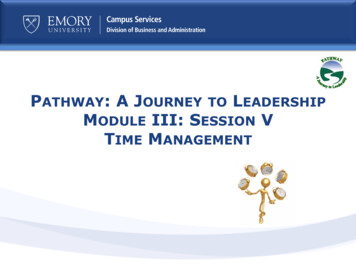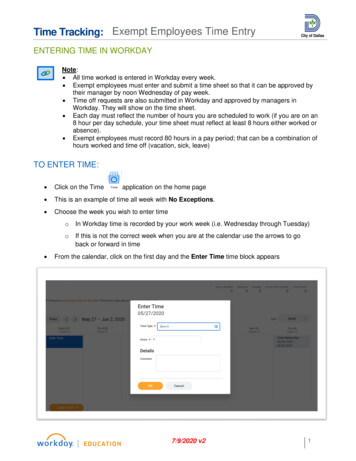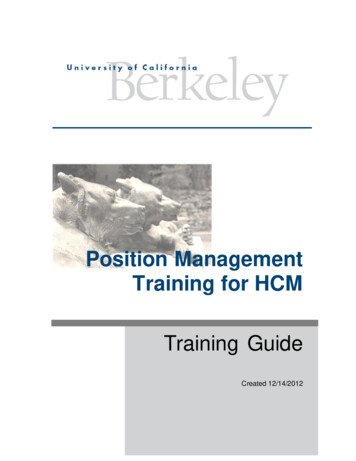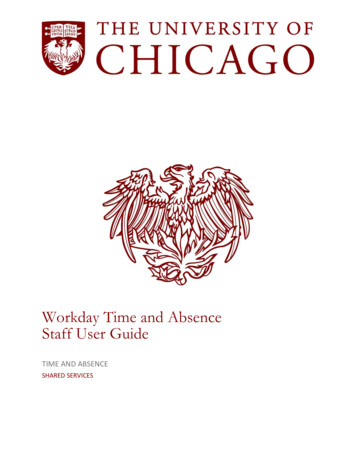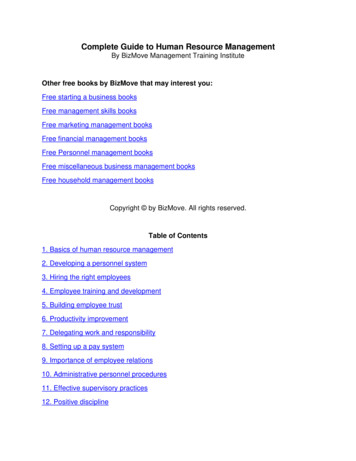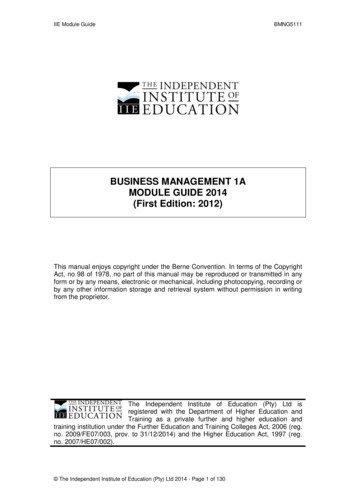
Transcription
TIME MANAGEMENTAmerican Management Association / www.amanet.org
American Management Association / www.amanet.org
TIMEMANAGEMENTBRIAN TRACYN e w Yo r k.San FranciscoA M E R I C A N M A N A G E M E N T A S S O C I AT I O NAtlanta.BrusselsShanghai.To k y o. Chicago . Mexico City. To r o n t o . W a s h i n g t o n, D.C.American Management Association / www.amanet.org
Bulk discounts available. For details visit:www.amacombooks.org/go/specialsalesOr contact special sales:Phone: 800-250-5308 / E-mail: specialsls@amanet.orgView all the AMACOM titles at: www.amacombooks.orgThis publication is designed to provide accurate and authoritative information inregard to the subject matter covered. It is sold with the understanding that thepublisher is not engaged in rendering legal, accounting, or other professionalservice. If legal advice or other expert assistance is required, the services of a competent professional person should be sought.Library of Congress Cataloging-in-Publication DataTracy, Brian.Time management / Brian Tracy.pages cmIncludes index.ISBN-13: 978-0-8144-3343-0ISBN-10: 0-8144-3343-X1. Time management. I. Title.HD69.T54T727 2014650.1'1—dc232013037775 2013 Brian TracyAll rights reserved.Printed in the United States of America.This publication may not be reproduced, stored in a retrieval system, or transmittedin whole or in part, in any form or by any means, electronic, mechanical, photocopying, recording, or otherwise, without the prior written permission of AMACOM, adivision of American Management Association, 1601 Broadway, New York, NY 10019.About AMAAmerican Management Association (www.amanet.org) is a world leader in talentdevelopment, advancing the skills of individuals to drive business success. Ourmission is to support the goals of individuals and organizations through acomplete range of products and services, including classroom and virtual seminars,webcasts, webinars, podcasts, conferences, corporate and government solutions,business books, and research. AMA’s approach to improving performance combines experiential learning—learning through doing—with opportunities for ongoing professional growth at every step of one’s career journey.Printing number10 9 8 7 6 5 4 3 2 1American Management Association / www.amanet.org
C O N T E N T SIntroduction 11The Psychology of Time Management 42Determine Your Values 103Think About Your Vision and Mission 154Project Forward, Look Backward 205Make Written Plans 256Chart Your Projects 297Create Your Daily “To-Do” List 348Set Clear Priorities 409Stay on Track 4710Determine Your Key Result Areas 53American Management Association / www.amanet.org
11Delegate to Others 5912Concentrate Single-Mindedly 6213Overcome Procrastination 6714Create Blocks of Time 7115Control Interruptions 7516Batch Your Tasks 7817Manage the Telephone 8118Conduct Effective Meetings 8519Read Faster, Remember More 8920Invest in Personal Development 9321Organize Your Work Space 96Conclusion 98Index 101About the Author 105Free Sample Chapter from Success Under Stress 107American Management Association / www.amanet.org
Introductionmanage your time, as much as any otherpractice in your career as an executive, will determine yoursuccess or failure. Time is the one indispensable and irreplaceable resource of accomplishment. It is your most precious asset. It cannot be saved, nor can it be recovered oncelost. Everything you have to do requires time, and the betteryou use your time, the more you will accomplish, and thegreater will be your rewards.Time management is essential for maximum health andpersonal effectiveness. The degree to which you feel in control of your time and your life is a major determinant of yourlevel of inner peace, harmony, and mental well-being. A feeling of being “out of control” of your time is the major sourceof stress, anxiety, and depression. The better you can organizeYOUR A B I L I T Y T OAmerican Management Association / www.amanet.org
2TIME MANAGEMENTand control the critical events of your life, the better you willfeel, moment to moment, the more energy you will have, thebetter you will sleep, and the more you will get done.It is possible for you to gain two productive hours eachworking day, or even double your output and your productivity, by using the ideas and methods taught in this book.These techniques have proven successful for many thousands of executives in every field of endeavor, and they willprove successful for you, too, as long as you have what I callthe four Ds.The Four Ds of EffectivenessThe first D is desire: You must have an intense, burningdesire to get your time under control and to achieve maximum effectiveness.The second D is decisiveness: You must make a clear decision that you are going to practice good time managementtechniques until they become a habit.The third D stands for determination: You must be willingto persist in the face of all temptations to the contrary untilyou have become an effective time manager. Your desire willreinforce your determination.And finally, the most important key to success in life, thefourth D, is discipline: You must discipline yourself to maketime management a lifelong practice. Effective discipline isthe willingness to force yourself to pay the price, and to dowhat you know you should do, when you should do it,whether you feel like it or not. This is critical for success.American Management Association / www.amanet.org
INTRODUCTION3The payoff for becoming an excellent time manager ishuge. It is the outwardly identifiable quality of a high performer vs. a low performer. All winners in life use their timewell. All poor performers in life use their time poorly. One ofthe most important rules for success is simply to “form goodhabits and make them your masters.” In this book, you willlearn how to form good habits and then let them form you.What you will learn in this book are the twenty-one mostimportant solutions to effective time management thatalmost all highly productive people have discovered andincorporated into their lives.Remember that time management is really life management. Good time management and personal productivitybegins by valuing your life, and every minute of that life.Do What You Can, with What You Have,Right Where You AreYou should say to yourself, “My life is precious and important, and I value every single minute and hour of it. I amgoing to use those hours properly so that I accomplish themost I can, in the time that I have.”The good news is that time management is a businessskill, and all business skills are learnable. Time managementis like riding a bicycle, typing on a keyboard, or playing asport. It is made up of a series of methods, strategies, andtechniques. It is a skill set that you can learn, practice, andmaster with determination and repetition.American Management Association / www.amanet.org
ONEThe Psychology ofTime Managementand feel about yourself largely determinesthe quality of your life, and the emotional core of your personality is your self-esteem, defined as “how much you likeyourself.”Your self-esteem is largely determined by the way youuse your life and time in the development of your full potential. Your self-esteem increases when you are working efficiently, and your self-esteem goes down when you are not.The flip side of the coin of self-esteem is called “self-efficacy,” defined as the degree to which you feel you are competent, capable, and productive, able to solve your problems,do your work, and achieve your goals.The more competent, capable, and productive you feel,the higher your self-esteem. The higher your self-esteem,HOW YOU THINKAmerican Management Association / www.amanet.org
THE PSYCHOLOGY OF TIME MANAGEMENT5the more productive and capable you will be. Each one supports and reinforces the other.People who manage their time well feel positive, confident, and in charge of their lives.The Law of ControlThe psychology of time management is based on a simpleprinciple called the Law of Control. This law says that youfeel good about yourself to the degree to which you feel youare in control of your own life. This law also says that you feelnegative about yourself to the degree to which you feel thatyou are not in control of your own life or work.Psychologists refer to the difference between an internallocus of control, where you feel that you are the master ofyour own destiny, and an external locus of control, where youfeel that you are controlled by circumstances outside yourself.When you have an external locus of control, you feel thatyou are controlled by your boss and your bills, and by thepressure of your work and responsibilities. You feel that youhave too much to do in too little time, and that you are notreally in charge of your time and your life. Most of what youare doing, hour after hour, is reacting and responding toexternal events.There is a big difference between action that is selfdetermined and goal-directed and reaction, which is animmediate response to external pressure. It’s the differencebetween feeling positive and in control of your life and feeling negative, stressed, and pressured. To perform at yourAmerican Management Association / www.amanet.org
6TIME MANAGEMENTbest, you must have a strong feeling of control in the important areas of your business and personal life.Your Thoughts and FeelingsIn psychological terms, each person has a self-concept, aninternal master program that regulates his behavior in everyimportant area of life. People with a high self-conceptregarding time management see themselves and think aboutthemselves as being well organized and productive. They arevery much in charge of their lives and their work.Your self-concept is made up of all of your ideas, pictures, images, and especially your beliefs about yourself,especially regarding the way you manage your time. Somepeople believe themselves to be extremely well organizedand efficient. Others feel continuously overwhelmed bydemands of other people and circumstances.Beliefs Become RealitiesWhat are your beliefs about yourself and your ability tomanage your own time? Do you see yourself and think aboutyourself as a highly efficient and effective time manager? Doyou believe you are highly productive and in complete control of your life and your work? Whatever your belief, if youthink of yourself as an excellent time manager, you will naturally do those things that are consistent with that belief.Because your self-concept causes you to continuallystrive for consistency between the person you see yourselfas, on the inside, and the way you perform on the outside, ifAmerican Management Association / www.amanet.org
THE PSYCHOLOGY OF TIME MANAGEMENT7you believe you manage your time well, you will be a goodtime manager.You can take all of the courses on time management,read all the books, and practice the various systems, but ifyou perceive yourself as being a poor time manager, nothingwill help. If you have developed the habit of being late formeetings and appointments, or you believe that you are adisorganized person, those habits become your automaticbehavior. If you do not change your beliefs about your personal levels of effectiveness and efficiency, your ability tomanage your time will not change, either.Make a DecisionHow do you develop new, positive beliefs about yourselfand your level of personal productivity? Fortunately, it isnot difficult. You simply use the four Ds: desire, decisiveness, determination, and discipline. Most important, makea decision to develop a specific time management habit,like being early for every meeting for the foreseeable future.Every change in your life comes about when you make aclear, unequivocal decision to do something differently.Making the decision to become an excellent time manageris the first major step.Program Your MindOnce you have made the decision to become a highly productive person, there are a series of personal programmingtechniques that you can practice.American Management Association / www.amanet.org
8TIME MANAGEMENTThe first is to change your inner dialogue. Ninety-fivepercent of your emotions, and your eventual actions, aredetermined by the way that you talk to yourself most of thetime. Repeat to yourself, “I am well organized and highlyproductive.” Whenever you feel overwhelmed with too muchwork, take a time-out and say to yourself, “I am well organized and highly productive.”Affirm over and over to yourself that “I am an excellenttime manager.” If people ask you about your time usage, tellthem “I am an excellent time manager.”Whenever you say that “I am well organized,” your subconscious accepts these words as a command and begins tomotivate and drive you toward actually becoming wellorganized in your behaviors.Visualize Yourself as You Want to BeThe second way to transform your behaviors is to visualizeyourself as an excellent time manager. See yourself as orga nized, efficient, and in control of your life. Remember, theperson you “see” on the inside is the person you will “be” onthe outside.If you are already a well-organized and highly productiveperson, how would you behave differently? What would bedifferent from the way you behave today? Create a picture ofyourself as calm, confident, highly efficient, more relaxed,and able to complete large amounts of work in a shortperiod of time.American Management Association / www.amanet.org
THE PSYCHOLOGY OF TIME MANAGEMENT9Imagine what a highly productive person would looklike. Would the person’s desk be clear and tidy? Would theperson appear unhurried and unstressed? Create a clearmental picture of yourself as a person who is in control of histime and life.Act “As If”The third way to program yourself is to act “as if” you werealready a good time manager. Think of yourself as being wellorganized in everything you do. If you were already excellentin time management, how would you behave? What wouldyou be doing differently
C O N T E N T S Introduction1 1 The Psychology of Time Management4 2 Determine Your Values10 3 Think About Your Vision and Mission15 4 Project Forward, Look Backward20 5 Make Written Plans25 6 Chart Your Projects29 7 Create Your Daily “To-Do” List34 8 Set Clear Priorities40 9 Stay on Track47 10 Determine Your Key Result Areas53 American Management Association / www.amanet.org

